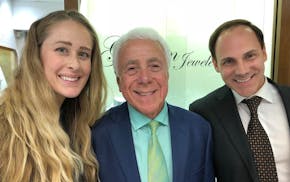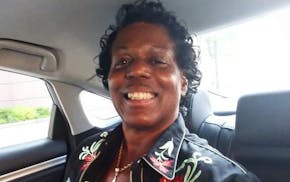None of those Kardashians would ever stage a public appearance, now would they?
Word has it that Kim Kardashian's Los Angeles court appearance Friday — featuring her runway-stomping, tight-faced exit, protected by sheriff's deputies — was a better acting performance than she gave in Tyler Perry's "Temptation."
I'm hearing that Kardashian received a courtesy call Thursday that her estranged 72-day husband, NBA player Kris Humphries, would not attend what various media claim was a mandatory settlement hearing in their divorce case. The judge was also reportedly informed of Humphries' plans not to be there. Humphries, who can be a real dunderhead, should be slapped with a sanction for deciding to attend a game instead.
That said, when Humphries wants an annulment (because he believes the marriage was a fraud she perpetrated for reality show ratings) while Kardashian wants a divorce, how far can settlement talks be expected to go?
"Humphries' lawyers said no settlement was reached and that a trial is still scheduled for May 6," read an AP story. Humphries has been told to make the next settlement conference, which is after the NBA regular season has ended.
Of course, I want to know why Kris not showing for this hearing is a bigger deal than the court reportedly excusing Kardashian from attending the first day of trial because she has a fashion commitment?
There were also reports that Judge Hank Goldberg yelled at Humphries' lawyers because Kris was not there. Really, folks?
Those California media must have exceptional hearing, since these proceedings were closed to them. A yelling judge is juicy stuff but would show bias on the part of His Honor. And does a judge, even one near La La Land, want to look as though taking up for these ridiculous Kardashians is more important than judicial decorum so early in the procedurals?
Better to go with Anthony McCartney's Associated Press report on the court, which included nothing about bench screaming.
Kardashian looked great in the maternity outfit she wore to the hearing. She is expecting a child with rapper Kanye West, who had the good taste not to go to court with Kardashian. Tacky is how I always view the presence of new loves at such matters.
Given Kardashian's delicate condition, her stubborn refusal to put this 2011 marriage behind her tells me one thing: that there is some benefit for Humphries in getting an annulment that he wouldn't enjoy should there be a divorce.
Another case for Bouza
Former Minneapolis Police Chief Tony Bouza is betting tonight's PBS documentary "The Central Park Five" will miss one salient point around the miscarriage of justice that resulted in the conviction of five young men for a vicious crime they did not commit against a jogger on April 19, 1989.
"I'm guessing, but making an informed guess, that cops got promoted on the basis of that frame up, and they are afraid now to reopen the case," Bouza told me Monday. "That's why they don't want to try it. The New York Police Department keeps hanging tough."
Bouza knows this story because it's a chapter in his new book, his 10th — "Expert Witness: Breaking the Policemen's Blue Code of Silence." It's about cases of alleged misconduct and corruption by police, collected from Bouza's 22 years as a witness for the defense on behalf of those who've sued, claiming police officers acted wrongly.
Always brutally honest, Bouza handed me the book last week after a chance meeting at the Lunds on Lake Street, saying, "There are a lot of cases here, but the one I would recommend you read would be 21 — 'The Central Park Jogger.' That case contains everything, including framed black and Hispanic kids. It's still news. Ken Burns did a documentary.
"This case is not resolved; there's a reason it's not resolved. The framed kids are suing the police, and the police don't want to have to admit they made a mistake, promoted people for framing them. And they don't want to take it back. … If that case doesn't grab you, then don't read another line."
The case study would be a grabber even if not written in Bouza's compelling style: "A chance encounter at New York's Auburn Correctional Facility in the late 1990s led to the unraveling of the mystery. One of the five convicted, still in prison seven years after being sentenced, ran into an inmate who was surprised to discover this young man was still in for a crime which this other inmate [serving time for killing a woman in 1989] had actually committed," Bouza writes on page 72.
This inmate "was a latter day Jack the Ripper, except more menacingly; his victims weren't prostitutes but single, white, middle-class, working young women," reads Bouza's book. But the police failed to make a connection between a series of crimes that Matias Reyes had committed.
Reyes' ultimate confession, supported with DNA evidence, included a chilling detail on page 74 about what happened shortly after Reyes attacked and raped the jogger: "As he was leaving the park, he was briefly questioned by a detective he knew as 'Blondie' and let go. A telling example of his sang-froid."
The movie trailer for the documentary says the convictions were secured with coerced false confessions and without any evidence of blood on the kids or DNA matches. It examines the failure by all the usual players — police, prosecutors, defense attorneys, reporters.
Ken Burns, his daughter Sarah Burns and her husband, David McMahon, makers of the movie, did not interview Bouza for the documentary. "They should have," said Bouza. "He's going to miss a very important part of that issue."
Bouza said he was "hired by the original attorney for the five, who sued when they were released. Since then I've heard nothing. I think they've changed lawyers."
C.J. can be reached at cj@startribune.com and seen on FOX 9's "Buzz."

C.J.: Jerry O'Connell gets support from Wendy Williams for talk show




